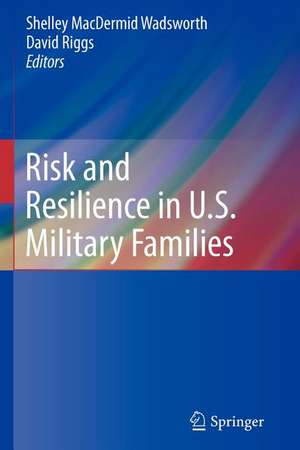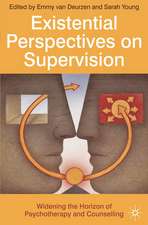Risk and Resilience in U.S. Military Families
Editat de Shelley MacDermid-Wadsworth, David Riggsen Limba Engleză Paperback – 4 oct 2012
| Toate formatele și edițiile | Preț | Express |
|---|---|---|
| Paperback (1) | 1099.56 lei 6-8 săpt. | |
| Springer – 4 oct 2012 | 1099.56 lei 6-8 săpt. | |
| Hardback (1) | 1106.50 lei 6-8 săpt. | |
| Springer – 10 noi 2010 | 1106.50 lei 6-8 săpt. |
Preț: 1099.56 lei
Preț vechi: 1157.44 lei
-5% Nou
Puncte Express: 1649
Preț estimativ în valută:
210.43€ • 218.88$ • 173.72£
210.43€ • 218.88$ • 173.72£
Carte tipărită la comandă
Livrare economică 14-28 aprilie
Preluare comenzi: 021 569.72.76
Specificații
ISBN-13: 9781461455943
ISBN-10: 1461455944
Pagini: 392
Ilustrații: XX, 369 p. 9 illus.
Dimensiuni: 155 x 235 x 21 mm
Greutate: 0.55 kg
Ediția:2011
Editura: Springer
Colecția Springer
Locul publicării:New York, NY, United States
ISBN-10: 1461455944
Pagini: 392
Ilustrații: XX, 369 p. 9 illus.
Dimensiuni: 155 x 235 x 21 mm
Greutate: 0.55 kg
Ediția:2011
Editura: Springer
Colecția Springer
Locul publicării:New York, NY, United States
Public țintă
Professional/practitionerCuprins
U.S. Military Families Under Stress: What We Know and What We Need to Know.-I. Marital Functioning.-Introduction.-Does Deployment Keep Marriages Together or Break Them Apart? Evidence from Afghanistan and Iraq.-Couple Functioning and PTSD in Returning OIF Soldiers: Preliminary Findings from the Readiness and Resilience in National Guard Soldiers Project.-Distress in Spouses of Combat Veterans with PTSD: The Importance of Interpersonally Based Cognitions and Behaviors.-Empirically Guided Community Intervention for Partner Abuse, Child Maltreatment, Suicidality, and Substance Misuse.-II. Parenting and Child Outcomes.-Introduction.-Child Maltreatment within Military Families.-Attachment Ties in Military Families: Mothers’ Perceptions of Interactions with their Children, Stress, and Social Competence.-Wartime Deployment and Military Children: Applying Prevention Science to Enhance Family Resilience.-Understanding the Deployment Experience for Children from Military Families.-III. Family Sequelae of Wounds and Injuries.-Introduction.-Trauma, PTSD, and Partner Violence in Military Families.-Couples’ Psychosocial Adaptation to Combat Wounds and Injuries.-Parent and Adolescent Positive and Negative Disability-Related Events and their Relation to Adjustment.-Working with Combat Injured Families Through the Recovery Trajectory.-IV. Single Service Members.-Introduction.-Deployment, Reenlistment Intentions, and Actual Reenlistment: Single and Married Active-Component Service Members.-Post-Deployment Indicators of Single Soldiers’ Wellbeing.-The Single Service Member: Substance Use, Stress, and Mental Health Issues.-Single Military Mothers in the New Millennium: Stresses, Supports, and Effects of Deployment.-Conclusion
Recenzii
From the reviews:
“Provides a thorough review of clinical issues and strategies related to state-of-the-art assessment and treatment relevant to couples, children, and adolescents in the military family. … The intended audience for this volume includes professionals who are interested in working with a military population … . interesting, informative, and thought provoking primarily with respect to the assessment and treatment of military families … . Any mental health provider interested in this population … will find the book enjoyable and useful with respect to professional responsibilities.” (Steven Bucky, PsycCRITIQUES, Vol. 56 (31), August, 2011)
“Provides a thorough review of clinical issues and strategies related to state-of-the-art assessment and treatment relevant to couples, children, and adolescents in the military family. … The intended audience for this volume includes professionals who are interested in working with a military population … . interesting, informative, and thought provoking primarily with respect to the assessment and treatment of military families … . Any mental health provider interested in this population … will find the book enjoyable and useful with respect to professional responsibilities.” (Steven Bucky, PsycCRITIQUES, Vol. 56 (31), August, 2011)
Notă biografică
Dr. Shelley MacDermid Wadsworth is a professor of Child Development and Family Studies. She serves as director of the Center for Families at Purdue University, as well as director of the Military Family Research Institute. The primary focus of Professor MacDermid's research is the connection between work conditions and family life. She is particularly interested in links among work-family tension, marriage, and parenting, and she has studied workplaces as contexts for adult development. Her research has been published in several journals, including Journal of Marriage and the Family; Journal of Family Issues; and, Family Relations. She has received research funds from the Alfred P. Sloan Foundation, the Cooperative Extension Service, and the State of Indiana. In 1996, Professor MacDermid became the director of The Center for Families at Purdue University. Through the Center, she founded and now directs a membership organization focusing on family issues for employers in the Midwestern region. She has served as co-director of Military Families Research Institute since 1999. Professor MacDermid is the author of more than 90 invited or refereed research articles, chapters, books, and scientific presentations. Her research has won one national award, and she recently received the Award of Merit from the local chapter of Gamma Sigma Delta. Professor MacDermid has been an associate editor of two scientific journals, a member of the editorial boards for two others, and a reviewer for three additional publications. She also has reviewed for the National Science Foundation, the Social Sciences & Humanities Research Council of Canada, and the Royal Society of New Zealand Centres of Research Excellence Fund.
David S. Riggs, Ph.D. is the Executive Director of the Center for Deployment Psychology. Dr. Riggs received his B.A. from the University of Kansas and earned his Ph.D. at the State University of New York at Stony Brook in 1990 after completing a clinical psychology internship at the Medical University of South Carolina. Subsequently, he held clinical research positions at the Center for the Treatment and Study of Anxiety and the National Center for PTSD at the Boston VA Medical Center as well as academic appointments at the Medical College of Pennsylvania, Tufts University, Boston University and the University of Pennsylvania. As a clinical and research psychologist, much of David’s work has focused on trauma, violence and anxiety with a particular interest in the impact of PTSD and other anxiety disorders on the families of those directly affected. Dr. Riggs has published over 60 articles and book chapters and presented over 100 papers and workshops on topics including posttraumatic disorder, domestic violence, obsessive-compulsive disorder, and behavioral therapy. He served as a member of the PTSD Treatment Guidelines Committee and Chair of the Marital and Family Therapy subcommittee for the International Society for Traumatic Stress Studies. In addition, Dr. Riggs is very involved in disseminating effective psychological treatments and serves on the Dissemination Task Force of the International Society for Traumatic Stress Studies. He has trained numerous student and mental health professionals from the United States and other countries in techniques for treating PTSD, OCD and other anxiety disorders. This included training professionals in ways to address the needs of survivors of international terror, the 2004 Indian Ocean tsunami, Hurricane Katrina, military trauma, and sexual and physical assault. Recently he co-led a series of workshops to train military behavioral health professionals who are preparing to deploy to treat PTSD and other trauma-related distress. As the Director of the Center for Deployment Psychology, Dr. Riggs continues this effort as he oversees the development and delivery of training seminars to behavioral health professionals to prepare them to provide for the needs of deployed Service members and their families.
David S. Riggs, Ph.D. is the Executive Director of the Center for Deployment Psychology. Dr. Riggs received his B.A. from the University of Kansas and earned his Ph.D. at the State University of New York at Stony Brook in 1990 after completing a clinical psychology internship at the Medical University of South Carolina. Subsequently, he held clinical research positions at the Center for the Treatment and Study of Anxiety and the National Center for PTSD at the Boston VA Medical Center as well as academic appointments at the Medical College of Pennsylvania, Tufts University, Boston University and the University of Pennsylvania. As a clinical and research psychologist, much of David’s work has focused on trauma, violence and anxiety with a particular interest in the impact of PTSD and other anxiety disorders on the families of those directly affected. Dr. Riggs has published over 60 articles and book chapters and presented over 100 papers and workshops on topics including posttraumatic disorder, domestic violence, obsessive-compulsive disorder, and behavioral therapy. He served as a member of the PTSD Treatment Guidelines Committee and Chair of the Marital and Family Therapy subcommittee for the International Society for Traumatic Stress Studies. In addition, Dr. Riggs is very involved in disseminating effective psychological treatments and serves on the Dissemination Task Force of the International Society for Traumatic Stress Studies. He has trained numerous student and mental health professionals from the United States and other countries in techniques for treating PTSD, OCD and other anxiety disorders. This included training professionals in ways to address the needs of survivors of international terror, the 2004 Indian Ocean tsunami, Hurricane Katrina, military trauma, and sexual and physical assault. Recently he co-led a series of workshops to train military behavioral health professionals who are preparing to deploy to treat PTSD and other trauma-related distress. As the Director of the Center for Deployment Psychology, Dr. Riggs continues this effort as he oversees the development and delivery of training seminars to behavioral health professionals to prepare them to provide for the needs of deployed Service members and their families.
Textul de pe ultima copertă
Among the costs of the ongoing wars in Afghanistan and Iraq are the human losses -- over 5,000 dead and over 35,000 wounded. Additionally, service personnel often return with traumatic brain injuries, missing limbs, and severe psychological disorders. All of this exacerbates the stress that family members have had to endure since initial deployment. Written by military and civilian scholars across the medical and mental health fields, Risk and Resilience in Military Families focuses on four key areas of research: marital functioning, parenting and child outcomes, family sequelae of wounds and injuries, and single service members (who comprise half of currently active troops). The results are up-to-date (and occasionally surprising) findings on psychological health issues affecting service members and their loved ones, and proven strategies for promoting family resilience, intervening to reduce dysfunctional behavior, and guiding families through the recovery process. Training issues and recommendations for further research round out this singular volume.
Included among the topics:
•Deployment: Risk or protective factor for couples? •A community program for “secretive problems” (e.g., drug abuse) in the military. •Interventions for the combat-injured family. •Trauma, PTSD, and partner violence. •The deployment experience for children of service members. •The single mother in the military.
An important text for researchers and academics in family and military studies, as well as for social workers, providers, and policymakers, Risk and Resilience in Military Families offers innovative coverage of a distinctive population and its unique needs.
Included among the topics:
•Deployment: Risk or protective factor for couples? •A community program for “secretive problems” (e.g., drug abuse) in the military. •Interventions for the combat-injured family. •Trauma, PTSD, and partner violence. •The deployment experience for children of service members. •The single mother in the military.
An important text for researchers and academics in family and military studies, as well as for social workers, providers, and policymakers, Risk and Resilience in Military Families offers innovative coverage of a distinctive population and its unique needs.
Caracteristici
Presents new data and new analyses of the research on military families
Offers interdisciplinary perspective from military to mental health
Contributors are leading researchers in the field
Offers a mix of research and intervention
Includes supplementary material: sn.pub/extras
Offers interdisciplinary perspective from military to mental health
Contributors are leading researchers in the field
Offers a mix of research and intervention
Includes supplementary material: sn.pub/extras












